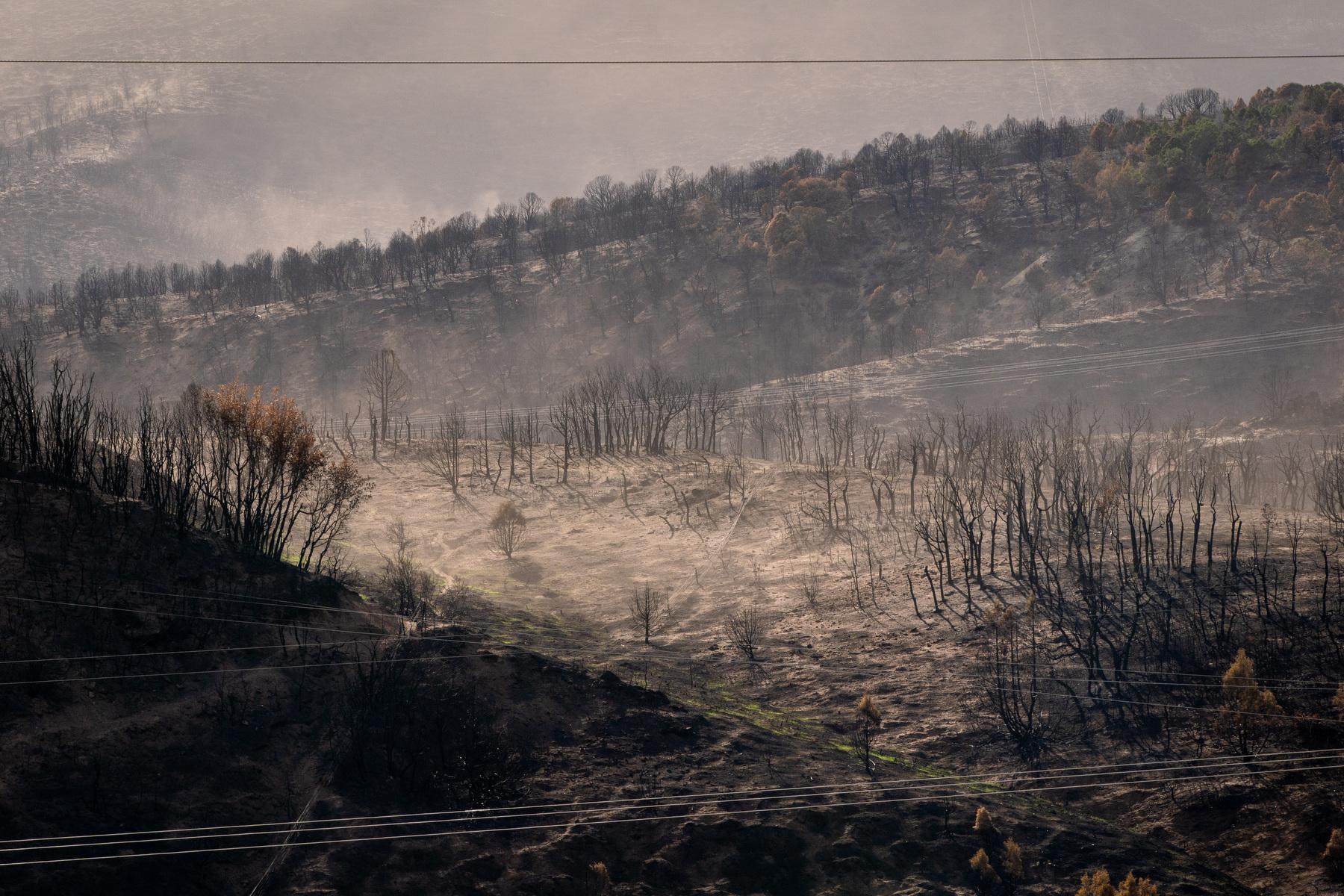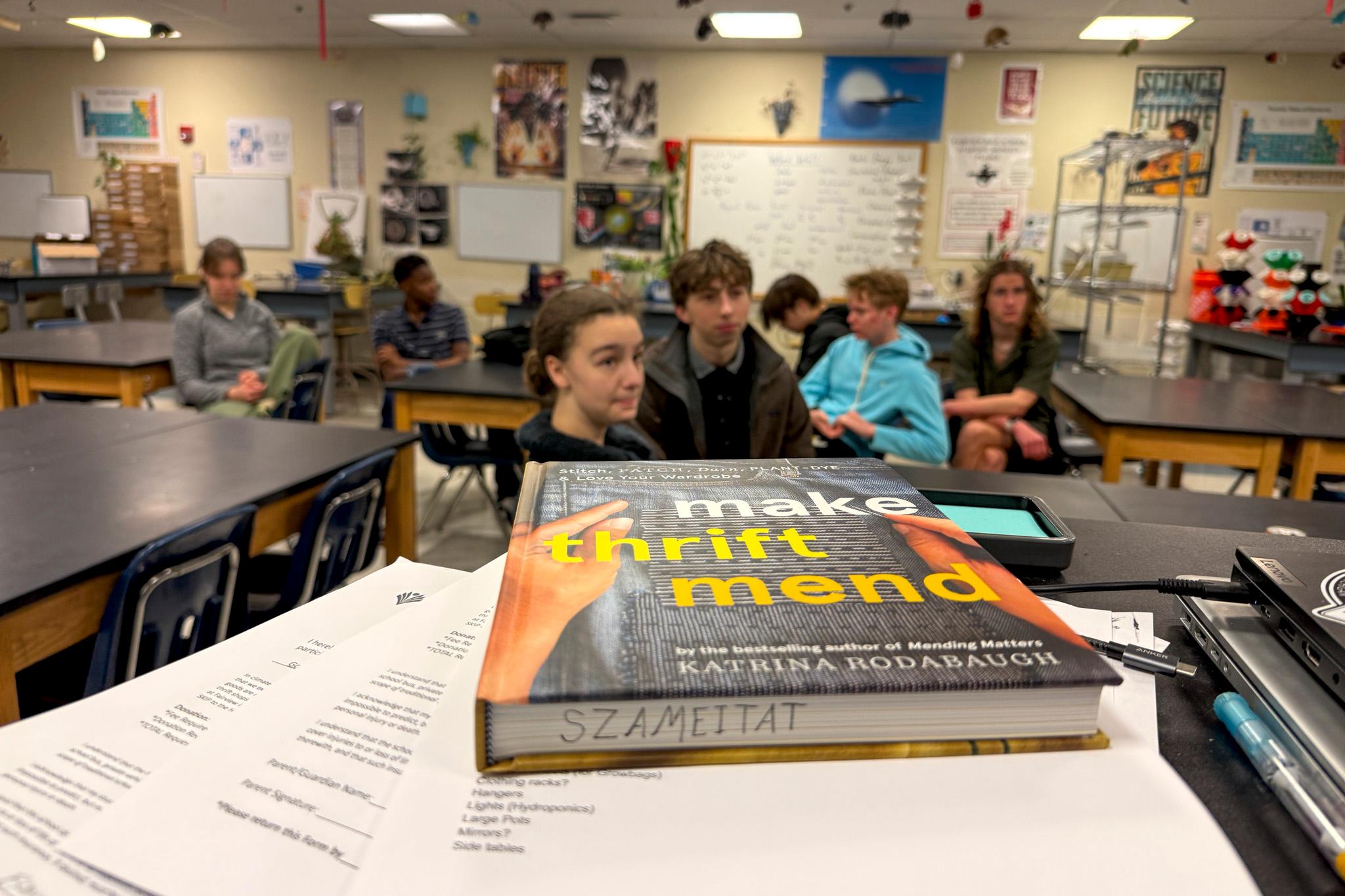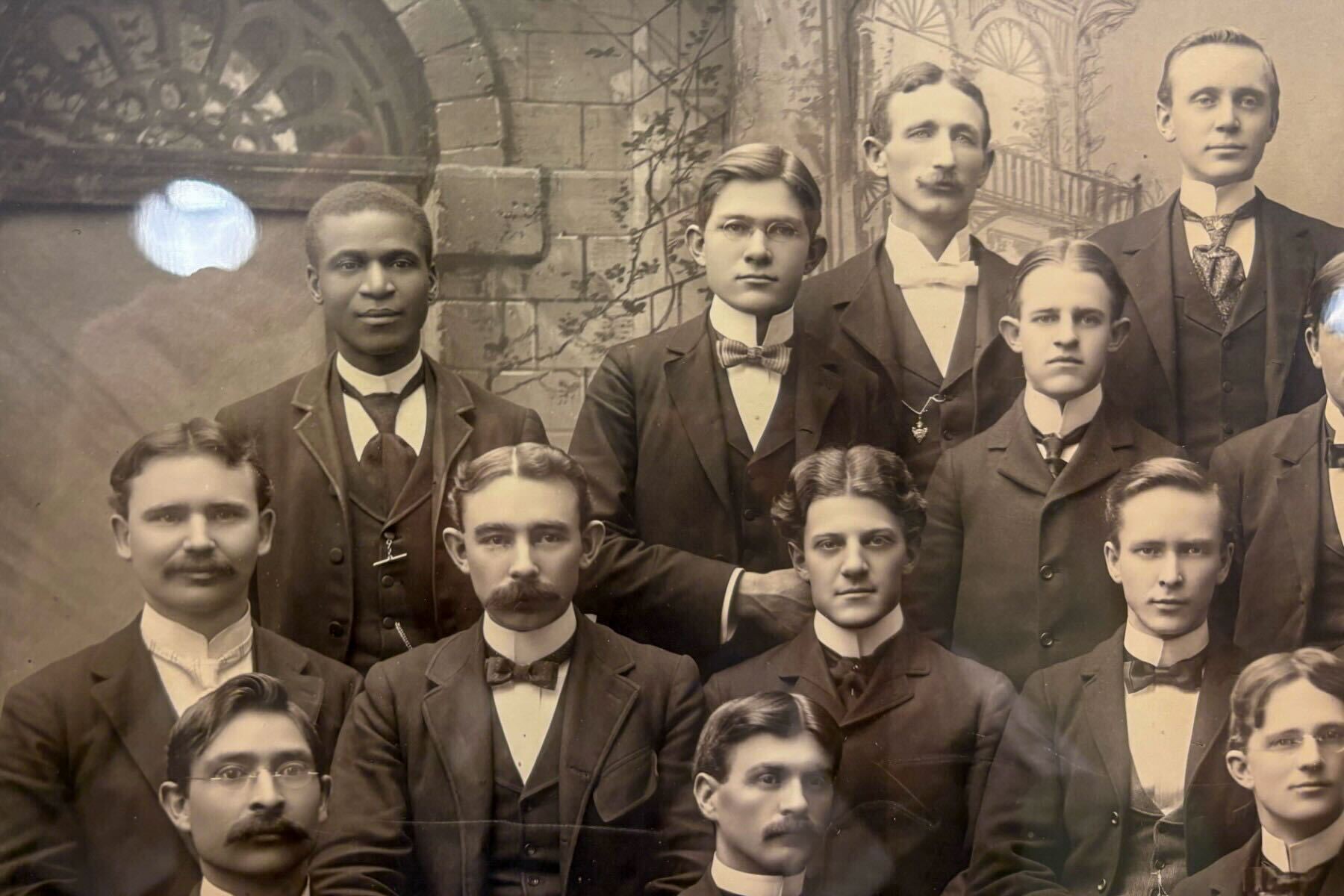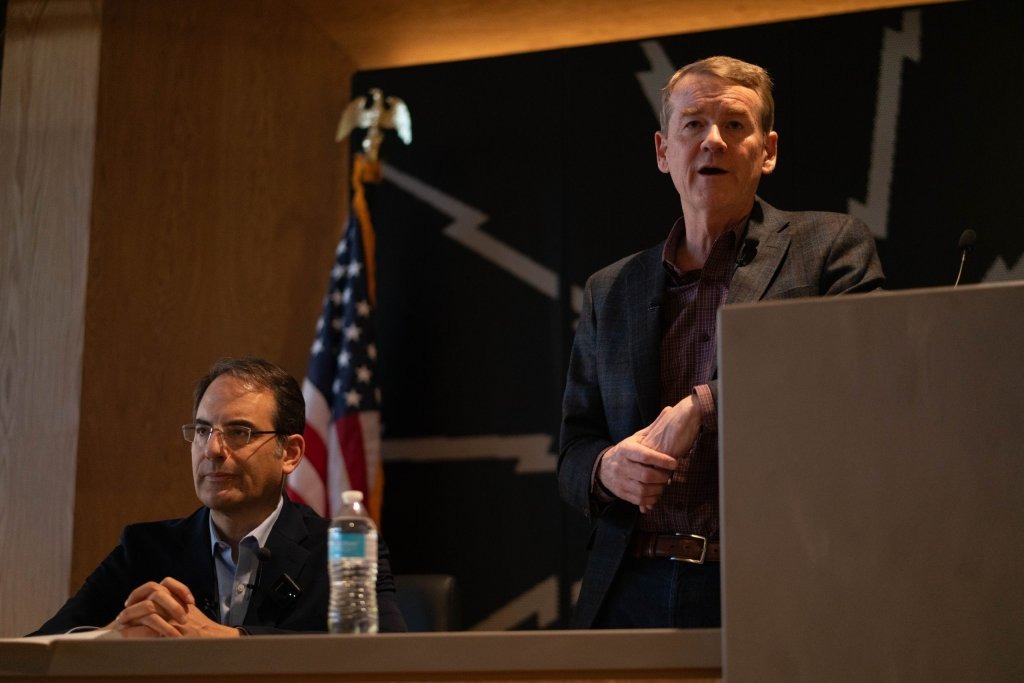
Colorado Republican chair Jeff Hays said Tuesday he expects his party to reject a proposal to cancel its primary election next June. The party's governing central committee will vote Saturday on a proposal to opt out of a new state law that allows the state's 1.2 million unaffiliated voters to vote in primaries.
- State Democratic Chair: Party Should Be Should Be Movement, Not Club
"We're silly if we don't go try to listen to them," Hays told Colorado Matters, because many unaffiliated voters lean toward the GOP.
The national party's standard-bearer, President Donald Trump, has only a 39 percent approval rating, according to the latest polls. Hays said it's too early whether that will be a drag on state candidates in 2018, including a crowded field of candidates for governor. As party chair, he said, he's asking those candidates to limit negative campaigning to avoid weakening the party in November — just as his Democratic counterpart is. But, he said, he's pushing even harder to convince voters not to tolerate divisive campaigns.
Read The Transcript:
Ryan Warner: This is Colorado Matters, from CPR News. I'm Ryan Warner. Colorado's 2018 election will be the first of its kind because the state's 1.2 million unaffiliated voters can take part in the primary without having to sign up with a party. At least that's the idea behind a new state law, but Republicans may cancel their primary, something this new law also allows. The GOP would instead hold caucuses, which only members can take part in. GOP leaders will vote Saturday on this question. To talk about that and the crowded gubernatorial field, I'm joined by state Republican chairman Jeff Hays of Monument. I'll say that we spoke with the Democratic chair yesterday on the program. And Jeff, welcome. Jeff Hays: Thank you, Ryan. It's a pleasure to be here. RW: So, some Republicans argue this semi-open primary takes away the party's right to choose candidates who will stick closely to its policies and beliefs. One opponent of the idea told the Denver Post, "Letting unaffiliated voters in would be like the New England Patriots choose the Broncos' quarterback." Are you at risk of losing the party's values by letting in unaffiliateds? JH: No, I don't think so. There are several, well, scores, hundreds, thousands, millions, maybe unaffiliated voters that really lean towards us anyway. They just don't like to be identified with a particular political party. And I look at that as being a challenge from our perspective to bring them back. There are people that have left our party because of, you know, one reason or another, and I think we need to you give them something to believe in. But regardless, unaffiliated voters make up over a third of our electorate. We are, we're silly if don't go try to listen to them, to understand what their concerns are, and to help them understand how their concerns and their needs fit with our values as Republicans. RW: Do you think that it will change the outcome of a primary in some tangible way? JH: It could. It depends on how many of those unaffiliated voters decide to participate in our primary, and how effective our candidates are at messaging and essentially recruiting those voters. RW: I mean, it sounds like it's an experiment, and you don't necessarily know what the outcome will be. JH: No, I don't. You know, I do disagree that it's an existential threat to the party organizations. I think if you look at other states that have even more open primaries than we have, their party organizations have thrived. Probably the bigger threat to the parties, and the goodness that the parties do provide, because it's essentially an organization and a training, a logistics body that does program management instead of project management. And I don't mean to speak in jargon, but if you look at the candidacy or a candidate, it's kind of a project. Getting that one person elected. The party pools resources that it combines and makes things more efficient for a block of people that are pretty like-minded to get candidates elected. RW: So for those unfamiliar with the new law, here's how it works. Before the primary election next June, unaffiliated voters will get two ballots. One with Democratic candidates, the other with Republicans. And if they want, they can choose one of the parties' ballots and vote in that election. What they can't do is mix their votes. That is, vote in some of the Republican races and some of the Democratic contests. There's been no move in the Democratic party to opt out of this open primary. The new law requires a 75 percent vote of the Republican central committee to circumvent it and do instead caucuses. Do you think that is likely to happen Saturday? JH: Well, if I can just clarify, the caucus and assembly process for both parties will remain intact. Nothing's gonna change that. You're still gonna meet in February at your precinct caucuses, elect delegates to the county and the state assembly, so that process is gonna remain regardless of what happens on Saturday. But I don't think that we're gonna be able to get 75 percent. It's difficult to get 75 percent of the people to agree that the sun's gonna come up tomorrow, so that's a pretty high bar. But we are gonna have discussions, and I think that's really important for our group, for our party. We have voices that need to be heard. We have people that want to express themselves, and as the state party chairman, I think it's my job to facilitate those conversations because the more information people have, the more likely they are to not only make a good, rational decision about the direction, but also to feel like their voices are heard and you get buy-in for whatever the decision is. RW: But you don't think that the GOP will clear that hurdle and thus- JH: I don't think, I don't think- RW: Its primary, you think, will be open. JH: No, I don't think there's 75 percent of the votes in the central committee to do away with that, because there are people in the central committee, a lot of them actually, probably voted for Proposition 108. I don't know how many, obviously, we haven't taken that poll, but- RW: Do you think that was with the idea of moving the party to the center? JH: I don't know. That's probably driven by different people's individual motivations. You know, we have our caucus and assembly processes, and there are a lot of people that don't like caucus and assembly. They don't like the way it's run, they don't like the way the outcomes have been. So, they wanted to have a primary. I think a lot of unaffiliated voters felt like, "If I'm a taxpayer and I'm paying for this through tax dollars, then I need to have a voice." I understand that rationale as well. RW: Because not as many people show up to a caucus as participate in a primary. JH: No, I think historically it's been 7 percent. RW: So the idea of the State GOP possibly excluding voters came up in a different way last year during the presidential nominating process. The party voted not to have a straw poll in the presidential race. All of Colorado's convention votes went to Texas Sen. Ted Cruz. Donald Trump claimed the whole thing was rigged against him here in this state. Does the majority of the state Republican Party support President Trump today? JH: Yeah, I think so. If you look at polling across the nation, the people that supported him still support him. He's got some pretty devoted followers. We have a certain percentage of Republicans that don't like the president. I think you find that in just about any electorate. The Democrats had the same thing, obviously with Bernie Sanders versus Hillary. They were divided in their loyalties as well, and I think you still see those same divisions. But yeah, I think in general people are supportive of the president, because he's starting to deliver on some things like taking better care of veterans. We're seeing fewer border crossings, we are really, I think maybe the most important thing is that the economy across the country, the business climate is being much more positive. We're seeing job growth. We're seeing more optimism among people about their financial futures. RW: Hadn't jobs been growing for the many years prior to his election? JH: Well, don't let me misinterpret any of that. The president should not have a tremendous impact on the economy. That means that you're basically taking away the free market. But the attitude of America First, the attitude and the anticipation of doing significant tax relief for the middle class and American workers, bringing money for investment dollars back from overseas. I mean, these kind of things, they create a sense of optimism that carries through the economy that you cannot argue that that was present in the Obama administration. RW: A compilation of dozens of polls by the website 538 finds President Trump with only a 39 percent approval rating. Will the President be a help or a drag on Republican candidates in 2018 in Colorado? JH: I think it's too early to say. There's so many things that have to be done. If we get victory in the significant tax reform, I think that's going to send shockwaves throughout the electorate because it's going to impact positively everybody in the economy. If we can get traction on repealing, overturning, modifying, significantly improving Obamacare, for example, the Affordable Care Act, then I think that's going to tip people our way because the current situation is unsustainable. It's hurting a lot of people. So that's probably the biggest level of griping that I've heard from the Republican electorate is our inability to make significant change in the Affordable Care Act. RW: What do you make of that inability? You've got control of the U.S. House, of the Senate, and of the White House. JH: Well there's a difference between arithmetic and reality. For example, Sen. Susan Collins, she didn't vote for the Repeal Act, I believe it was in 2015, even when there was no hope that Barack Obama was going to sign the bill. So now you go from 52 to 51, and you have certain senators that if it's not perfect, they're not going to vote for it. So now you're down to 50 or 49, and the Democrats are holding firm on their side. You're not going to get any converts from their side. So the arithmetic versus the reality and the personalities involved, they're two different things. RW: You're listening to Colorado Matters, I'm Ryan Warner and we're speaking with Jeff Hays who chairs the State Republican Party. Yesterday on the program we heard from the State Democratic Chair, and that conversation lives at CPRnews.org. Moving on, particularly to the 2018 governor's race here, where Republicans have announced seven candidates. JH: Ryan, there's room. You can jump in the race. It's not too late. RW: In other words, you expect that number to grow, do you think? JH: It might grow, yes. RW: Have you talked to people who are going to increase it to eight or nine? JH: It'll happen. RW: It'll happen. JH: It'll happen when it happens. I'm not privy to say. RW: How do you as party chair keep them from ripping each other to shreds and weakening the final Republican candidate against the Democrats? JH: I heard my colleague, Morgan Carroll's interview and I think she's been proactive in getting the candidates to not beat each other up. Our candidates, themselves, thus far have been pretty good about self-policing. I think they realize how distasteful they can be. The message that I'd been trying to convey is not so much to the candidates but really to our electorate. Don't tolerate it. Demand that the candidates talk about themselves and what they're going to do because if you respond positively to their negative attacks, you're giving them positive feedback. You know what I'm saying? You're encouraging them to trash their opponents. RW: Are you sort of standing tall with a big stick, Jeff Hays, and imploring them to remain positive or are you relying more on that self-policing? JH: I relying on self-policing because that's the, I feel like that is a- RW: How Republican right? It's self-determination. JH: Well, we do have a little bit of rebellion in our genes over on the Republican side and they don't like to be told what to do. If the voters, if our Republican electorate awards, or rewards, excuse me, is a better word, rewards that type of behavior, we are going to get the kind of candidates and the type of government that we deserve, not what we want. It's up to the voters to really insist that if we've got candidates that are going negative and they're not talking about their own plans and their own vision, well, they need to correct those candidates. RW: When you talk about vision, I'd like to use that as an entry point to talk about issues, what issues do you think will dominate particularly the governors' race in Colorado? JH: Well, we're still quite a ways out. I think that schools and school choice is something that's very close to people's hearts. They're concerned about our school performance across the state. There's some regional issues, water is always an issue in Colorado. The Eastern Plains are very concerned about water. Transportation is another issue. In general, those can be lumped under economics. There are elements of the Colorado economy that are doing very well. I think people would like to see that sustained and improved. RW: You say transportation, what you often hear from, say, the current governor is that there needs to be more money in order to make roads less crowded. What do you say? JH: Well, nothing is free. That's for sure. There are tough choices in governing whether you're in the legislature and you're trying to pass bills and trying to get cooperation, not just from the other side but also from your own folks. People that live in Fort Morgan have a very different perspective than those that live in Castle Rock, for example. We have different issues. When I drive up to Denver, I feel the pain of the I-25 corridor, but we also have to get our crops into the markets from the Eastern Plains. I'm not a policy guy, that's not my job. I do trust our legislators even on the Democrat side. I believe that they do want to work for the good of Colorado. The thing that I think is a big challenge for Colorado, we are the eighth largest state geographically, we are probably one of the most diverse states in the mountain regions, the Western Slope, the Eastern Plains, the I-25 Corridor, we all have such different parochial concerns. That really requires a lot of leadership, not only from the governor's position but also internal to the legislature, to figure out how to get rid of those parochial concerns and serve the greater good. RW: Let's look at one of the Republican candidates, George Brauchler. He's district attorney in Arapahoe County, prosecuted the Aurora theater killer. He has identified himself as one the more conservative candidates in the race. Do you think that he can win with these unaffiliateds added to the mix? JH: I cannot swing at that softball you just tossed me because, and I was actually joking with George. I said, "You realize if I get a eyelash in my eye and I look like I'm winking at you, people are going to think that I favor you or any other candidate." I'm going to have to play politician and deflect on that question because I think a lot of our candidates have an opportunity to win. I think they bring different skillsets. They bring different perspectives. It's just going to be up to them to run good campaigns, to message effectively, and finish the race. That's one of the challenges a well. I hate to be so deflective, but if I say too many positive things about George or Doug or Vic or any of them, I'll exclude somebody else and people will think I'm playing favorites. I am absolutely, adamantly opposed to putting my thumb on the scale. RW: What do you mean finish the race as difficulty, just briefly? JH: You have to raise money to have enough funds to do those last minute mailers, to buy the TV ads or the radio ads, or to hire the staff. You have to be able to finish the race financially. You also have to be able to have enough energy and passion to be able to continue to engage voters in the last minute because most people don't pay attention until the very last minute. There are candidates that they start out early and then they fade and that's part of victory is being able to, you know how football teams will hold their hands up in the fourth quarter, you know they're going to have to finish the race. And time will tell as to which one of those candidates actually does that. RW: And I want to point out that it's not just the governor's office that's at stake, the legislature is up for grabs too, Democrats hold the majority in the House but your party has a one-vote margin in the Senate and we're coming up over the next few years on re-apportionment and re-districting, where Congressional and Legislative districts are redrawn. So if you've detected at all a theme of sports metaphors in Jeff's? JH: That's my strike zone now. RW: Hays' comments, I want to ask you, about an item on your LinkedIn site. I noticed that you were a kicking consultant for the Denver Broncos. JH: I was. RW: And helped them to a conference championship by increasing their punting and kickoff performance. JH: Well, I would like to hope that I added to their success. We were one bad game away from going to the Super Bowl. That was Ben Roesthlisberger's rookie year and we lost but yeah, I had the real honor of working with Jason Elam. Jason is an incredible human being. I mean he's a commercial pilot, phenomenal athlete, great family man. Just a committed person in so many different areas. That was a real blessing for me to get to work with Jason. And really that entire organization. Yeah I mean they were competing for the World Championship every year and being serious contenders. They were well-run from the top all the way to the bottom. RW: This is Elam, the place kicker. Jeff, thanks so much for being with us. JH: Thank you. It's an honor. RW: Jeff Hays of Monument. Used to work with the Broncos and now he chairs the state Republican Party. He's also a former chairman in El Paso County and a management consultant. Yesterday, as we said, we spoke with his Democratic counterpart, that's Morgan Carroll and you can hear our conversation at CPRNews.org. This is Colorado Matters from CPR News. |








